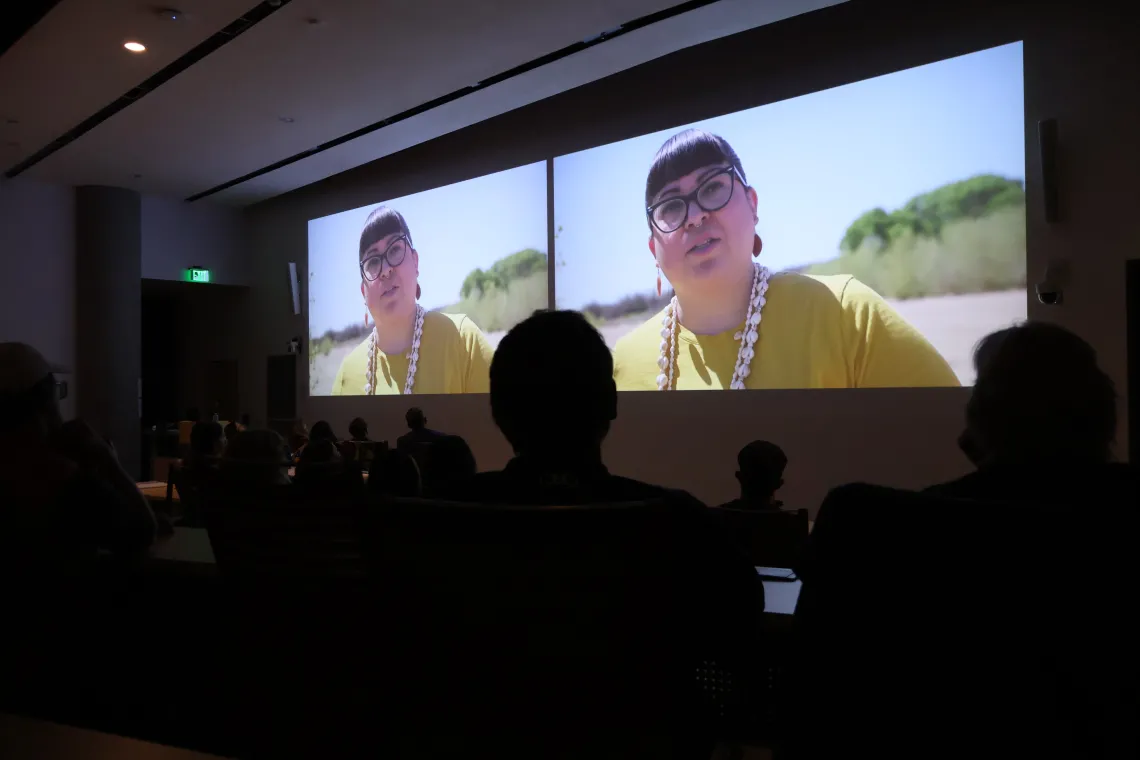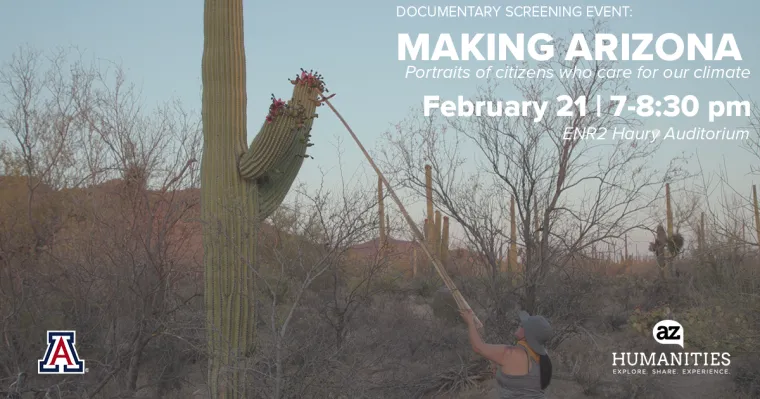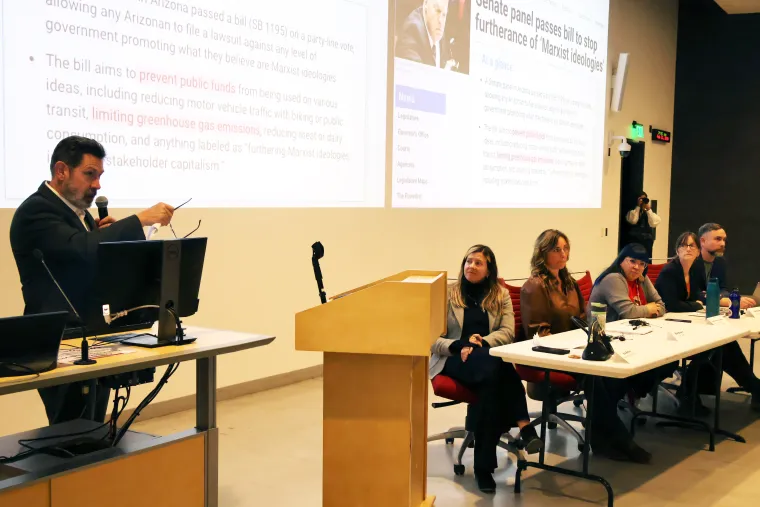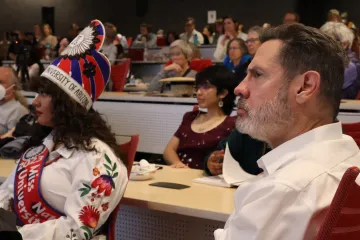‘Making Arizona’ Documentary Premiere and Climate Conversation Draws Capacity Crowd
Community members filled the Agense Nelms Haury Lecture Hall at UArizona’s ENR2 building for the first of four statewide Climate Conversations with filmmaker Michael Mulcahy.

It was standing-room-only at the premiere of Michael Mulcahy’s short documentary series, Making Arizona. The Tucson event kicked off the first of four associated ‘Climate Conversations’ scheduled to take place across the state.
Community members and climate-concerned locals packed the Agnese Nelms Haury Lecture Hall at UArizona’s ENR2 building on the evening of Wednesday, Feb. 21 for the chance to catch the first-ever screening of UArizona Associate Professor in the School of Theatre, Film and Television and 2023-24 Udall Center Fellow Michael Mulcahy’s documentary series, and to engage with climate experts and those involved with the production of the short films.
“I’m absolutely thrilled with the turnout for our first Climate Conversation in Tucson,” said Mulcahy after the event concluded. “Based on the number of people who were willing to show up on a weekday evening and the level of engagement from those in attendance, it’s clear that there is a strong desire to move climate action forward in our desert community.”
The First Film

The first installment in the series screened at the February event was a portrait of Tohono O’odham Community College faculty member and citizen of the Tohono O’odham Nation Jacelle Ramon-Sauberan as she harvested saguaro fruit and explored the southern Arizona desert with her family.
“The video shares the history of how my community, the San Xavier District, have fought for our land and water,” says Ramon-Sauberan. “Our Himdag (or “way of life”), and what has been instilled in us since creation, is what has kept us going in protecting t-jewedga (Land/Earth),” she says.
“Being an O’odham woman living in today’s society, I feel that I have to walk in two different worlds,” said Ramon-Sauberan. “You have the O’odham world and then, as we say in O’odham, the Mimiligan world, the Western world. Trying to find a balance in navigating both of those is hard.”
In the film, Ramon-Sauberan spoke of the O’odham Himdag, which maintains the importance of mutual respect and stewardship for the land, each other and other beings. Himdag also incorporates relational value and working together for the common good. This notion, Ramon-Sauberan says, is challenged at times because the Western frame of thinking tends to focus on individualism.
“Within the O’odham Himdag…it’s not like that,” says Ramon-Sauberan.
The Climate Conversation

The first screening event opened with remarks from Mulcahy and Nadira Sage Mitchell (Diné/Navajo), a student researcher and writer on the project who also serves as the current Miss Native American University of Arizona. The screening of the 30-minute film followed a panel discussion on the threats facing the Grand Canyon State as a result of climate change. Experts in attendance included:
- Eva Romero, Ph.D., Moderator and Production Consultant at Sol Partners Consulting Firm.
- Jacelle Ramon-Sauberan, Ph.D., Faculty in the Tohono O’odham Studies Program at Tohono O’odham Community College and Making Arizona documentary subject.
- Sandy Bahr, M.L.S., Grand Canyon Chapter Director for the Sierra Club
- Blue Baldwin, Storm to Shade Program Manager for Tucson Water, City of Tucson
- Mark Kear, PhD, Economic Geographer and Assistant Professor in the UArizona School of Geography, Development & Environment

Multiple climate-and-environment-focused nonprofits tabled at the premiere, giving attendees the opportunity to transform their good intentions into positive climate action on the spot.
“The goal of Making Arizona,” Mulcahy says, “is to bring a diverse range of voices into conversation and, through personal stories and concrete information, motivate Arizonans to advocate for sustainable climate action.”
To that end, in addition to the series of films currently in production and the three Climate Conversations scheduled to take place in Chandler, Flagstaff and Yuma following the Tucson, Ariz. event, the Making Arizona project also includes plans to develop a climate-based curriculum for use in K-12 classrooms.
“The idea here is to get more Arizonans involved directly in the protection of our land, water and wildlife,” says Mulcahy, “and it all starts with helping our residents better understand the role we can all play in demanding that lawmakers and other decision makers take seriously the threats to the state that are on the near horizon as a result of the changing climate.”
The dates for the free Chandler, Flagstaff and Yuma screenings and Climate Conversation events are still TBD. Stay tuned for details as they become available.
Making Arizona is supported by the Arizona Institute for Resilience, the Udall Center for Studies in Public Policy, the College of Fine Arts, and the School of Theatre, Film, & Television. It is also funded in part by the Southwest Center, the Southwestern Foundation for Education and Historical Preservation and Arizona Humanities.
Learn more about the Making Arizona project and watch a trailer for the first short film here.

